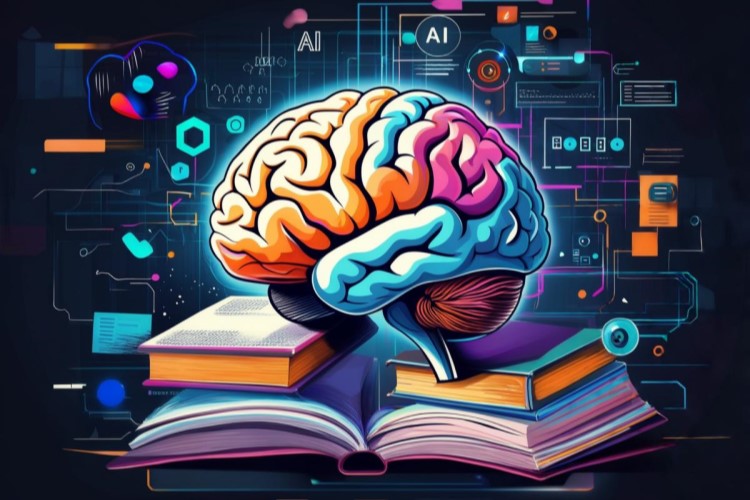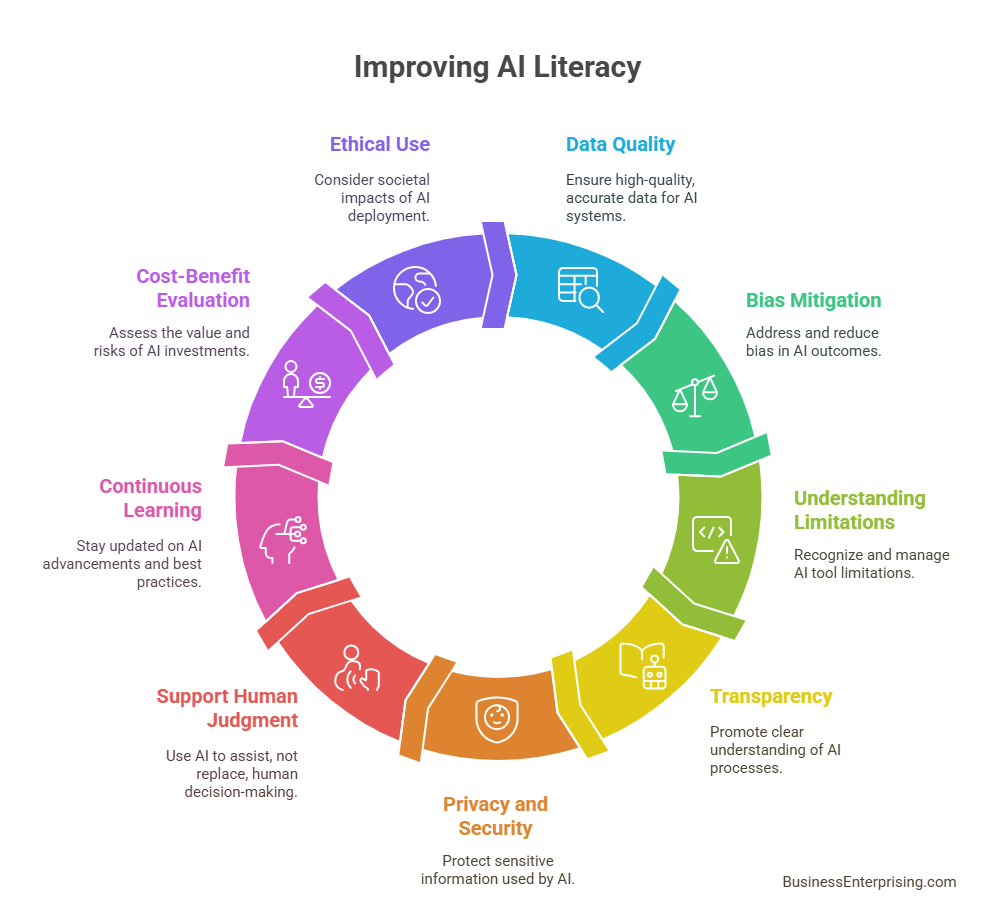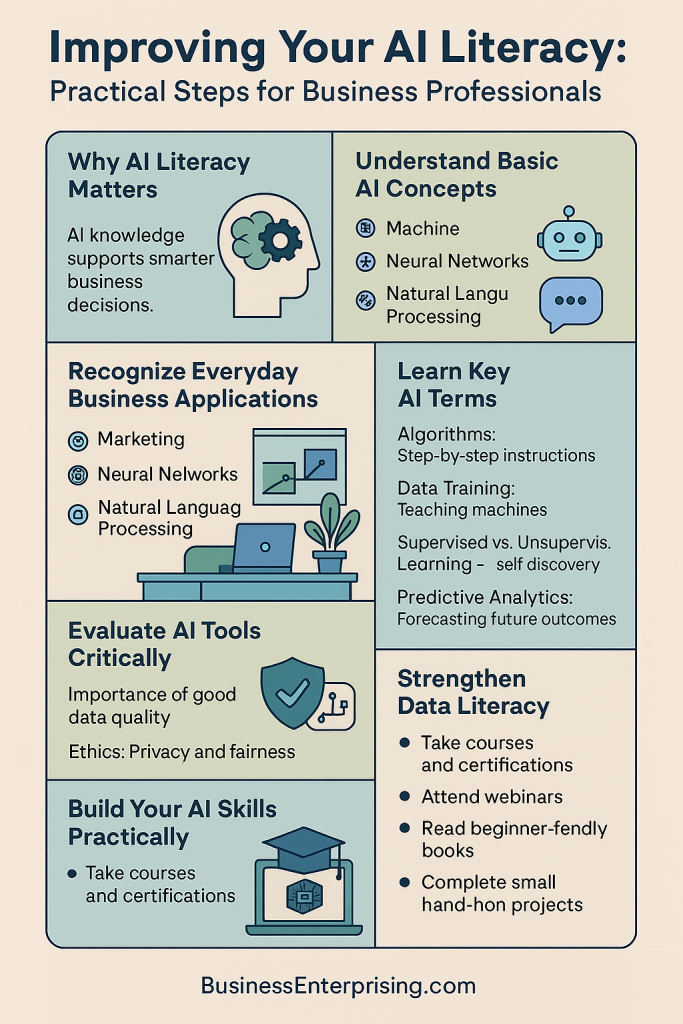
However, AI can seem confusing if you are not familiar with how it works. Therefore, starting with simple ideas like machine learning and data training can make a big difference. Additionally, learning about common applications will help you see AI’s real-world value more clearly.
Moreover, recognizing the limits of AI will keep you from falling for marketing hype or overpromising tools. Therefore, it is important to build your knowledge carefully and ask the right questions. Additionally, a basic understanding of data collection, quality, and ethics will improve how you evaluate AI systems.
Taking time to build these skills can make AI feel less intimidating and more useful for your business needs. Therefore, improving your AI literacy helps you approach technology with a clear, confident mindset. Additionally, it prepares you to spot opportunities where AI can actually make your work easier and more effective.
Understanding the Basics of Artificial Intelligence
Understanding the basics of artificial intelligence is the first step to improving your AI literacy. At its core, AI refers to machines designed to mimic human thinking. These systems can analyze information, recognize patterns, and make simple decisions on their own. Therefore, having a basic knowledge of AI concepts will help you better understand how these systems work.
One important concept is machine learning. Machine learning teaches computers to improve performance based on experience rather than specific programming. For example, a machine learning model might study thousands of pictures to learn how to spot a cat. Additionally, another major concept is neural networks. Neural networks are computer systems inspired by the structure of the human brain. They help machines process complex information in layers, much like people recognize faces or voices.
Moreover, natural language processing is another key area to understand. Natural language processing allows machines to understand and respond to human language. You interact with this technology every time you use a chatbot or a voice assistant. As AI becomes part of more business operations, understanding these concepts becomes increasingly important for you.
However, you do not need to become a technical expert to be proficient. Instead, focus on improving your familiarity with these key ideas. Therefore, by improving your AI literacy, you will be better prepared to spot new opportunities and avoid common misunderstandings. Additionally, you will be able to make smarter decisions about which AI tools might work best for your needs.
Recognizing AI Applications in Everyday Business
Recognizing AI applications in everyday business is an important part of improving your AI literacy. AI is already a powerful tool across different industries. Therefore, understanding where and how it operates can help you make smarter decisions for your business.
In marketing, AI can analyze customer behavior and suggest personalized product recommendations. These tools help you target the right customers at the right time. Additionally, AI is used in customer service to power chatbots that answer questions quickly and accurately. This allows your team to focus on more complex customer needs.
Moreover, AI supports operations by predicting supply chain disruptions before they happen. It helps you better manage inventory and streamline logistics. In finance, AI monitors transactions in real time to detect unusual activities. Therefore, you can spot potential fraud faster and protect your assets more effectively.
Additionally, AI is influencing business decision-making processes. AI models can evaluate large amounts of data quickly and identify patterns you might not notice. This leads to better forecasting, smarter resource allocation, and improved risk management for your company. However, it is important to remember that AI supports decision-making but does not replace your judgment.
Recognizing these practical uses of AI helps you understand its strengths and limitations. Therefore, improving your AI literacy gives you an edge when adopting new technologies. Additionally, it prepares you to ask better questions when choosing which AI tools to use in your business.
Important AI Terminologies Every Professional Should Know
Learning key AI terminologies is an important step toward improving your AI literacy. Understanding these basic terms will make it easier for you to work with AI technologies. Therefore, becoming familiar with them helps you participate in important conversations with more confidence.
First, you should know what an algorithm is. An algorithm is simply a set of instructions that tells a machine how to solve a problem. Additionally, algorithms help systems process information and deliver results quickly. Data training is another important concept. Data training means feeding examples to a machine so it can learn to recognize patterns.
Moreover, it helps to understand the difference between supervised and unsupervised learning. In supervised learning, you give the machine labeled examples to guide its learning process. However, in unsupervised learning, the machine finds patterns without any labeled examples. Each method offers different advantages depending on your business goals.
Another useful term is predictive analytics. Predictive analytics uses past data to make guesses about future outcomes. Therefore, it can help you make smarter decisions based on likely trends. Additionally, predictive analytics is often used in marketing, finance, and operations.
Mastering these basic terms makes AI concepts feel less confusing. Therefore, improving your AI literacy is much easier when you understand the language that experts use. Additionally, having a stronger grasp of these ideas can help you recognize which AI tools make sense for your needs.
How to Critically Evaluate AI Tools and Technologies
Knowing how to critically evaluate AI tools is an important part of improving your AI literacy. With so many choices available, it can feel overwhelming. Therefore, learning a few basic evaluation skills will help you make smarter decisions for your business.
First, always start by understanding what the tool claims to do. Many AI tools promise fast, perfect results, but real performance can vary. Therefore, you should ask what data the tool uses and how it processes that data. Additionally, make sure you understand what problems the tool is actually solving.
However, it is just as important to recognize the limitations of AI tools. No tool can think like a human or predict the future with complete accuracy. Therefore, you should approach every AI tool with a realistic view of its strengths and weaknesses. Additionally, be cautious of any tool that offers little explanation of how it works.
Misconceptions about AI are common and can lead to poor decisions. Some people believe AI systems are always objective, but bias in data can affect results. Therefore, you must stay aware that no AI tool is truly neutral. Additionally, expensive tools are not always better than affordable ones.
By asking good questions and setting clear goals, you can better assess AI tools and technologies. Therefore, improving your AI literacy gives you an advantage when selecting the right systems for your needs. Additionally, it helps you avoid costly mistakes and build more efficient processes.
Developing Data Literacy to Strengthen AI Skills
Developing data literacy is a key part of improving your AI literacy. AI systems rely heavily on data to make predictions and decisions. Therefore, understanding how data is collected and used will help you work more effectively with AI tools.
First, you need to know where the data comes from. Data can be collected from customers, sensors, transactions, or public sources. However, not all data is accurate or useful. Therefore, you should always ask how the data was gathered and whether it truly represents the situation you want to understand.
Additionally, data quality matters just as much as quantity. Bad or incomplete data can lead to poor AI performance. Therefore, you should focus on using clean, consistent, and relevant data whenever possible. Additionally, regularly reviewing your data sources helps you spot errors before they create bigger problems.
Ethics is another important area to consider. AI systems can reinforce bias if they are trained on biased data. Therefore, you need to think carefully about how you collect and use data in your business. Additionally, protecting customer privacy and securing sensitive information must always be a priority.
By building stronger data literacy skills, you can help AI systems perform better and make more reliable decisions. Therefore, improving your AI literacy means thinking critically about every piece of information you use. Additionally, it helps you create AI processes that are fair, accurate, and respectful of the people involved.
Practical Ways to Build Your AI Knowledge
Finding practical ways to build your AI knowledge is an important part of improving your AI literacy. You do not need a technical background to start learning. Therefore, choosing the right tools and resources can help you move forward quickly and effectively.
First, you should consider taking beginner courses that explain basic AI concepts. Many short online programs introduce topics like machine learning and data science. Additionally, certifications can show others that you have a strong grasp of AI fundamentals. These programs often focus on practical applications instead of heavy theory.
Moreover, attending webinars is a simple way to stay current with new AI developments. Webinars often offer real-world examples and expert insights that you can apply right away. Therefore, participating in these events helps you understand how AI trends affect your business.
Additionally, reading beginner-friendly books about AI can give you a strong foundation without overwhelming you with technical details. However, hands-on experience is equally important. You can start small projects like using AI-powered tools to analyze marketing data or customer feedback.
Building your skills through both study and practice gives you a balanced understanding of how AI works. Therefore, improving your AI literacy becomes easier when you combine different types of learning. Additionally, you will feel more confident when choosing and using AI tools to meet your business goals.
Conclusion
Improving your AI literacy is a practical goal that can benefit you and your business in many ways. By learning the basics, you gain the ability to think more critically about the technologies you use. Therefore, you can make better choices about which tools and strategies fit your goals.
However, AI is a fast-moving field, and it is important to stay flexible as new developments emerge. Therefore, continuing to build your knowledge will help you adapt and grow alongside the technology. Additionally, having a strong foundation in AI concepts makes it easier for you to collaborate with technical teams.
Moreover, understanding AI applications and common terminology helps you see opportunities that others might miss. Additionally, learning how to evaluate tools and data quality keeps you from falling into common traps. Therefore, a practical approach to AI education can save you time, money, and frustration.
You do not need to become a specialist to make a difference. However, developing a strong base of AI knowledge can open doors and improve your decision-making. Therefore, taking small, steady steps toward improving your AI literacy will have long-lasting rewards. Additionally, you will be better prepared to lead your business with confidence in an AI-driven future.



